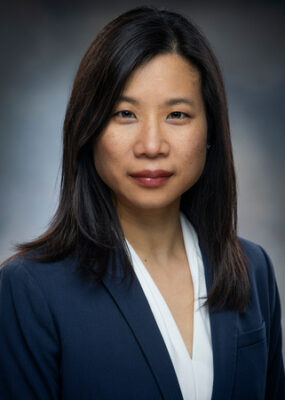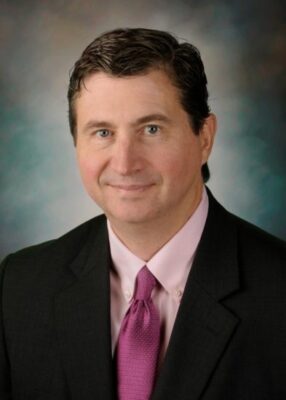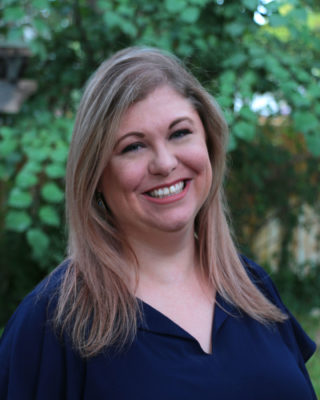Program Details
Integrated Curriculum
The UT Health San Antonio Cardiothoracic Surgery integrated curriculum is divided into two distinct phases of training: Foundations and Thoracic Surgery. The Foundations curriculum is focused on the first two years of the residency program and includes rotations in cardiothoracic surgery, general surgery, vascular surgery, transplant, pediatric surgery, trauma and emergency surgery, cardiology, pulmonary, radiology, and simulation training. The Thoracic Surgery curriculum spans years three through six and consists of graduated rotations in adult cardiac, general thoracic, and congenital heart surgery. This follows the Thoracic Surgical Curriculum provided by the Society of Thoracic Surgery. 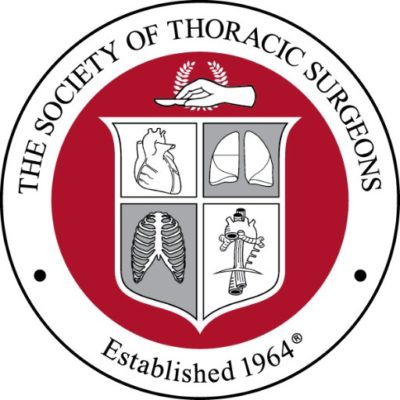 Graduates are eligible for certification by The American Board of Thoracic Surgery and fully competent in all areas of cardiothoracic surgery.
Graduates are eligible for certification by The American Board of Thoracic Surgery and fully competent in all areas of cardiothoracic surgery. 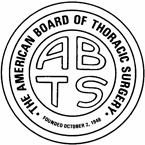 A description of clinical rotations and a sample schedule is included in the “Clinical Rotations” tab above.
A description of clinical rotations and a sample schedule is included in the “Clinical Rotations” tab above.
<h3>Clinical Rotations</h3>
As part of our mission for to train the best cardiothoracic surgery residents, we offer a wide range of rotations in all aspects of cardiothoracic surgery. Below you will see a sample of our clinic rotations block schedule along with a description of each of the rotations.
We encourage you to reach out for any questions on our residency program.
Sample Clinical Rotations Senior / Chief Block Schedule
| PGY3 | PGY4 | PGY5 | PGY6 | |
|---|---|---|---|---|
| July | Perfusion | Heart Failure | Thoracic | UH Cardiac |
| August | UH Cardiothoracic | Heart Failure | Thoracic | UH Cardiac |
| September | Thoracic | UH Cardiothoracic | UH Cardiac | Congenital |
| October | Thoracic | UH Cardiothoracic | UH Cardiac | Elective |
| November | UH Cardiothoracic | UH Cardiac | Heart Failure | Thoracic |
| December | UH Cardiothoracic | UH Cardiac | Heart Failure | Thoracic |
| January | SICU | Thoracic | Congenital | UH Cardiac |
| February | Cath Lab | Thoracic | UH Cardiothoracic | UH Cardiac |
| March | UH Cardiothoracic | UH Cardiac | Thoracic | Heart Failure |
| April | UH Cardiothoracic | UH Cardiac | Thoracic | Heart Failure |
| May | UH Cardiac | UH Cardiothoracic | Elective | Thoracic |
| June | UH Cardiac | Congenital | UH Cardiothoracic | Thoracic |
Sample Clinical Rotations Junior Block Schedule
| PGY1 | PGY2 | |
|---|---|---|
| July | UH Cardiothoracic | VA Vascular |
| August | General Surgery | VA Vascular / Methodist |
| September | Radiology | Methodist / Plastics |
| October | Anesthesia | Plastics / General Surgery |
| November | UH Vascular | General Surgery / Methodist |
| December | Simulation Skills Development | Methodist / Transplant |
| January | Trauma | Transplant / General Surgery |
| February | Pulmonary Consult | General Surgery / Trauma |
| March | General Surgery | Trauma / Surgical Oncology |
| April | SICU | Surgical Oncology |
| May | Heart Station | Surgical Oncology / VA CT / Peds |
| June | Advanced Laparoscopic Surgery | Pediatric Surgery |
Description of Clinical Rotations
University Hospital
 UH Cardiac – Resident functions as chief of the adult cardiac surgery service at University Hospital. Responsibilities include participating in all available cardiac surgeries (including lung transplant), directing rounds and managing inpatient care for all ICU and ACU cardiac patients, developing plans for and staffing adult cardiac consults, participating in outpatient cardiac and thoracic clinics, and coordinating and reviewing rotating residents from other service lines. Objectives include developing surgical skills, exposure to cardiac surgery, critical care management and leadership abilities. These are typically 2 month rotations, and are reserved for senior residents starting last month of PGY-3 through PGY-6.
UH Cardiac – Resident functions as chief of the adult cardiac surgery service at University Hospital. Responsibilities include participating in all available cardiac surgeries (including lung transplant), directing rounds and managing inpatient care for all ICU and ACU cardiac patients, developing plans for and staffing adult cardiac consults, participating in outpatient cardiac and thoracic clinics, and coordinating and reviewing rotating residents from other service lines. Objectives include developing surgical skills, exposure to cardiac surgery, critical care management and leadership abilities. These are typically 2 month rotations, and are reserved for senior residents starting last month of PGY-3 through PGY-6.
UH Cardiothoracic – Resident functions as chief of the adult thoracic surgery service at University Hospital while contributing to adult cardiac service as needed. Responsibilities include participating in all available thoracic surgeries as well as cardiac surgeries (and lung transplants) otherwise uncovered, directing rounds and managing inpatient care for all ICU and ACU thoracic patients, developing plans for and staffing thoracic consults, and participating in outpatient cardiac and thoracic clinics. Objectives include developing surgical skills, exposure to cardiac and thoracic surgery, and critical care management. These are typically 2 month rotations for senior residents from PGY-3 through PGY-6.
Congenital – Resident functions as surgical resident for multidisciplinary Congenital Cardiac service at University Hospital. Responsibilities include participating in all available surgeries, participating in multidisciplinary faculty rounds for pediatric cardiac care unit, and participating in outpatient clinic. Objectives include understanding complex anatomy and physiology, developing surgical skills, and functioning in a multidisciplinary settings. These are 1 month rotations for senior residents from PGY-3 through PGY-6.
Cath Lab – Resident functions as a junior interventional cardiology fellow. Responsibilities include participating in planning and implementation of all available interventional procedures, and participating in multidisciplinary rounds. Objectives include development of percutaneous and interventional skills while functioning in a multidisciplinary setting. These are 1 month rotations designed for PGY-3 residents.
Methodist Hospital
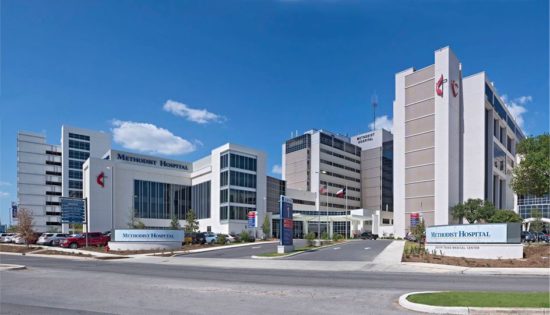 MHS Thoracic – Resident functions as chief of the thoracic service at Methodist Hospital. Responsibilities include participating in all available thoracic surgeries, rounding on and managing all ICU and ACU patients, developing plans for and staffing consults, and participating in outpatient cardiac and thoracic clinics. Objectives include developing surgical skills, exposure to thoracic surgery, and critical care management. These are typically 2 month rotations for senior residents from PGY-3 through PGY-6.
MHS Thoracic – Resident functions as chief of the thoracic service at Methodist Hospital. Responsibilities include participating in all available thoracic surgeries, rounding on and managing all ICU and ACU patients, developing plans for and staffing consults, and participating in outpatient cardiac and thoracic clinics. Objectives include developing surgical skills, exposure to thoracic surgery, and critical care management. These are typically 2 month rotations for senior residents from PGY-3 through PGY-6.
MHS Heart Failure – Resident functions as surgical resident for multidisciplinary Heart Failure/MCS service at Methodist Hospital. Responsibilities include participating in all available surgeries, participating in multidisciplinary faculty rounds for surgical patients, and participating in outpatient clinic. Objectives include developing surgical skills, knowledge and management of complex physiology, exposure to private practice model, and functioning in a multidisciplinary setting. These are 2 month rotations for senior residents from PGY-4 through PGY-6.
Elective – Each resident is offered one month during PGY-5 during which time they may pursue a particular interest within UT Health or at an outside institution.
Didactic Teaching Conferences
We have weekly didactic sessions in the form of teaching conferences for junior and senior residents led by our faculty that follow the Thoracic Surgical Curriculum provided by the Society of Thoracic Surgery.
Multidisciplinary Conferences
We have regularly scheduled conferences for specific disease processes often held in conjunction with other services or divisions:
- Structural Heart Conference (w/ Cardiology) – Every Tuesday, 11:30am-12:30pm
- Aortic Conference (w/ Vascular Surgery) – Every 3rd Wednesday, 4:00pm-5:00pm
- Thoracic Tumor Board (w/ Oncology) – Every Monday, 12:00pm-1:00pm
- Methodist Lung Cancer Conference – 2nd / 4th Wednesday each month, 7:00am-8:00am
- Methodist Complex GI Cancer Conference – 1st / 3rd Tuesday each month, 7:00am-8:00am
- Resident Case Conference – 4th Wednesday each month
Grand Rounds
Held every Thursday afternoon, Cardiothoracic Surgery Grand Rounds is a mix of resident presentations and invited speakers from within our institution and from all over the world to come talk about contemporary topics related to cardiothoracic surgery. Attendees include members from other departments in addition to our own faculty, residents and students.
These talks have sparked great discussion on how disease processes are managed, emerging techniques / technology, and our evolving role as cardiothoracic surgeons. It is also a great opportunity for our residents to get exposure to leaders in the field, as well as an opportunity to show what the Department of Cardiothoracic Surgery at UT Health San Antonio is about.
Journal Club
Held on the third Tuesday evening of every month, Journal Club is a dinner meeting of the residents and faculty of the Department. Each participant presents a paper from a recent issue of one of the two major journals for our specialty. A critical appraisal is given followed by discussion by the rest of the group. This is a great casual opportunity for residents of all levels to become comfortable speaking to an audience, and everyone on the team getting to spend time together outside of the hospital setting.
The Johnson Center for Surgical Innovation
The Johnson Center for Surgical Innovation (JCSI) was created from collaborative efforts between the Department of Surgery at the University of Texas Health Science Center San Antonio (UTHSCSA), members of the J. Bradley Aust Surgical Society and the Johnson family in honor of Dr. Stewart M. ‘Skeet’ Johnson and Mr. Hugh M. Johnson.
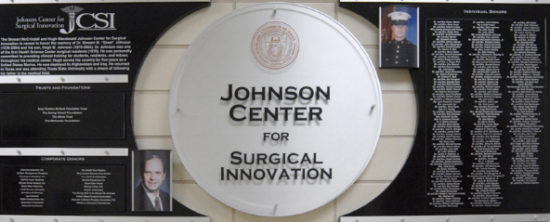
The JCSI is a 1300 square-foot simulation training facility designed to help surgery residents hone their skills in a safe, low-stakes environment. The JCSI is open to all residents 24 X 7 X 365. Additionally, all interns complete a one month dedicated skills lab rotation.
The JCSI is a certified testing site for the SAGES Fundamentals of Laparoscopic Surgery (FLS), Fundamentals of Endoscopic Surgery (FES), and Fundamental Use of Surgical Energy (FUSE) exams.
Wet Lab Simulation
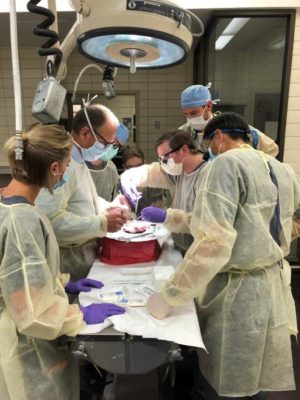
On a quarterly basis, in lieu of Grand Rounds, we arrange a Wet Lab experience. The use of animal tissues for teaching basic surgical skills, along with advanced surgical techniques provides an opportunity for faculty and trainee involvement in teaching in an environment with minimal stress, and a technical discussion that may not be possible in the operating room. We believe that it is a critical component of cardiothoracic surgical training.
Resources
- The TSRA Podcast (Soundcloud)
- The National Thoracic Surgical Curriculum (TSC)
- STS Learning Center
- TSDA Education

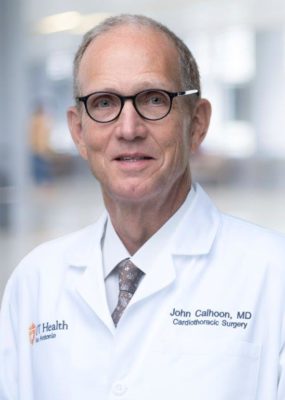 Program Director |
Program Director | 